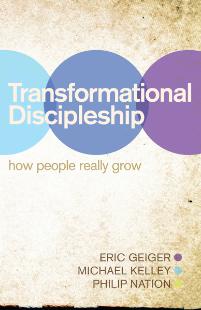 In June 2010 I wrote a review of Transformational Church which may interest readers. The follow-up book, Transformational Discipleship was recently released with great fanfare and high hopes, two years after its forerunner. People interested in church leadership and discipleship will want to read Transformational Discipleship. The three authors, Eric Geiger, Michael Kelley, and Phillip Nation traded off writing throughout the book with seamless expertise. As with many books on discipleship, the authors layout their convincing case of why churches are ineffective at making disciples. They aptly point out that “not all discipleship is transformational” (Kindle Location 159). They further pointed out that transformational discipleship is the primary job of the church and to be deficient in making disciples means that the church is deficient in her “reason for existence (Kindle Location 173). They stated more clearly and succinctly that discipleship is not disseminating information nor is it behavioral modification (Kindle Location 290).
In June 2010 I wrote a review of Transformational Church which may interest readers. The follow-up book, Transformational Discipleship was recently released with great fanfare and high hopes, two years after its forerunner. People interested in church leadership and discipleship will want to read Transformational Discipleship. The three authors, Eric Geiger, Michael Kelley, and Phillip Nation traded off writing throughout the book with seamless expertise. As with many books on discipleship, the authors layout their convincing case of why churches are ineffective at making disciples. They aptly point out that “not all discipleship is transformational” (Kindle Location 159). They further pointed out that transformational discipleship is the primary job of the church and to be deficient in making disciples means that the church is deficient in her “reason for existence (Kindle Location 173). They stated more clearly and succinctly that discipleship is not disseminating information nor is it behavioral modification (Kindle Location 290).
THE MIND-SET OF DISCIPLESHIP
Transformational Discipleship advances the subject on several points and one is particularly notable. What is the frame of mind or attitude by which many churches are doing discipleship? Is the church on offense or defense? Offensive discipleship equips believers with a strong faith with which to overcome the challenges they will face in the world (Kindle Location 515). On the other hand, most churches are doing defensive discipleship which focuses on protecting Christians from the threats they might face in the world. The difference is stark! Offensive discipleship builds Christian character and prepares Christians to face the inevitable faith challenges while defensive discipleship tends to hope and assume Christians will never face those faith challenges. Churches must adopt an attack discipleship mind-set.
Offensive discipleship builds Christian character and prepares Christians to face the inevitable faith challenges while defensive discipleship tends to hope and assume Christians will never face those faith challenges.
The authors seemed to agree that there is a need for some degree of accountability. They wrote, “Offensive discipleship includes insisting people accept full responsibility for their sin by, as an act of grace, refusing to accept foolish excuses” (Kindle Locations 630-631). They stated that the ultimate result of genuine discipleship must be “a transformed heart (and transformed affections)” (Kindle Location 462). Perhaps accountability may be found in defining whether one has been transformed.
A TRANSFORMATIONAL FRAMEWORK
Transformational Discipleship offers a “transformational framework” that includes three intersecting circles labeled truth, posture, and leaders. The area within the intersection of the three circles is called the “transformational sweet spot” (TSS) suggesting that a church within this cultural point of church health will be effective at making disciples. They wrote, “The TSS occurs when healthy leaders give truth to a disciple who is in a vulnerable posture” (Kindle Locations 950-951). The writers claim they are not offering a model to be followed. In fact they devoted almost a whole page encouraging leaders to avoid seeing the transformational framework as a model to be replicated (Kindle Location 924).
“Please do not view this as a model. Let us say that again: please do not view this as a model. This is not a model. The transformational framework should not become your new mission statement,…” (Kindle Locations 921-923, 926, 938)
TRANSFORMATIONAL DISCIPLESHIP IMPRESSIONS
OVERALL RATING: Four-Stars- I truly wanted to give a five-star award to Transformational Discipleship as I highly respect the authors and agree with virtually everything stated in the book. That being said, for discipleship ministries I look for practicality and application. The book has some of the same issues I raised in the review ofTransformational Church. Both books expound on the lack of healthy churches and transformational discipleship respectively while falling short of offering immediate solutions for church leaders. In fact I found both books to be “wonkish” meaning that two weeks after reading the material, leaders would not likely remember the specifics of the models—I mean frameworks offered. Granted, these issues are complex and require more than a simple model as assessments and remedies are offered at additional costs. As one pastor said, “We don’t need more books that simply restate the problems; what leaders need are usable solutions.” Perhaps it’s an oversimplification to expect a process out of a book that may be applied by local church leaders. Again, it is interesting that the authors of Transformational Discipleship went out of their way to dissuade people from adopting their framework as a model. If Transformational Discipleship is found to be transformational it will become a model. The fact is that regardless of the desires of the authors, the readers will decide whether Transformational Discipleship is used as a model.
If Transformational Discipleship is found to be transformational it will become a model.
_________________
Using my book review process, the title certainly passed the “stickiness factor” in that it draws readers to initially order or open the book. Transformational Discipleship gets a “FOUR-STAR” review. The only reason it gets a four-star instead of a five-star review is the “practicality” factor. The reading is engaging even as the authors get into their model– (Excuse me! I mean “framework). However with the …framework the connection to the reader may begin to break down as the leader reader is looking for the practical application. Suddenly the book ends with the expectations of the reader being somewhat let down as they are still looking for the practical points that they may use in their own ministries. Even so, it is worth the read if you are interested in church health and discipleship.
OVERALL RATING— 
- Introduction: 5-Stars
- Content: 5-Stars
- Connection: 4-Stars
- Practicality: 3-Stars
- Conclusion: 2-Stars
Some people may think that book reviews are purely subjective and arbitrary but there are specific criteria. While subjectivity cannot be removed, this writer makes an attempt to grade each book equally on its own merits.
——————–
Questions:
1. Do you agree or disagree with the review of Transformational Discipleship?
2. If you have read TD, do you feel it offers solutions to the problems the authors identify?
3. What “star-rating” would you give Transformational Discipleship?
——————–
Dr. Tom Cocklereece is CEO of RENOVA Coaching and Consulting, LLC. He is a pastor, author, professional coach, leadership specialist, and is a Certified Coach/Teacher/Speaker for the John Maxwell Team
Email | LinkedIn | Twitter | Web | Blog | Book | Coaching | Leadership








